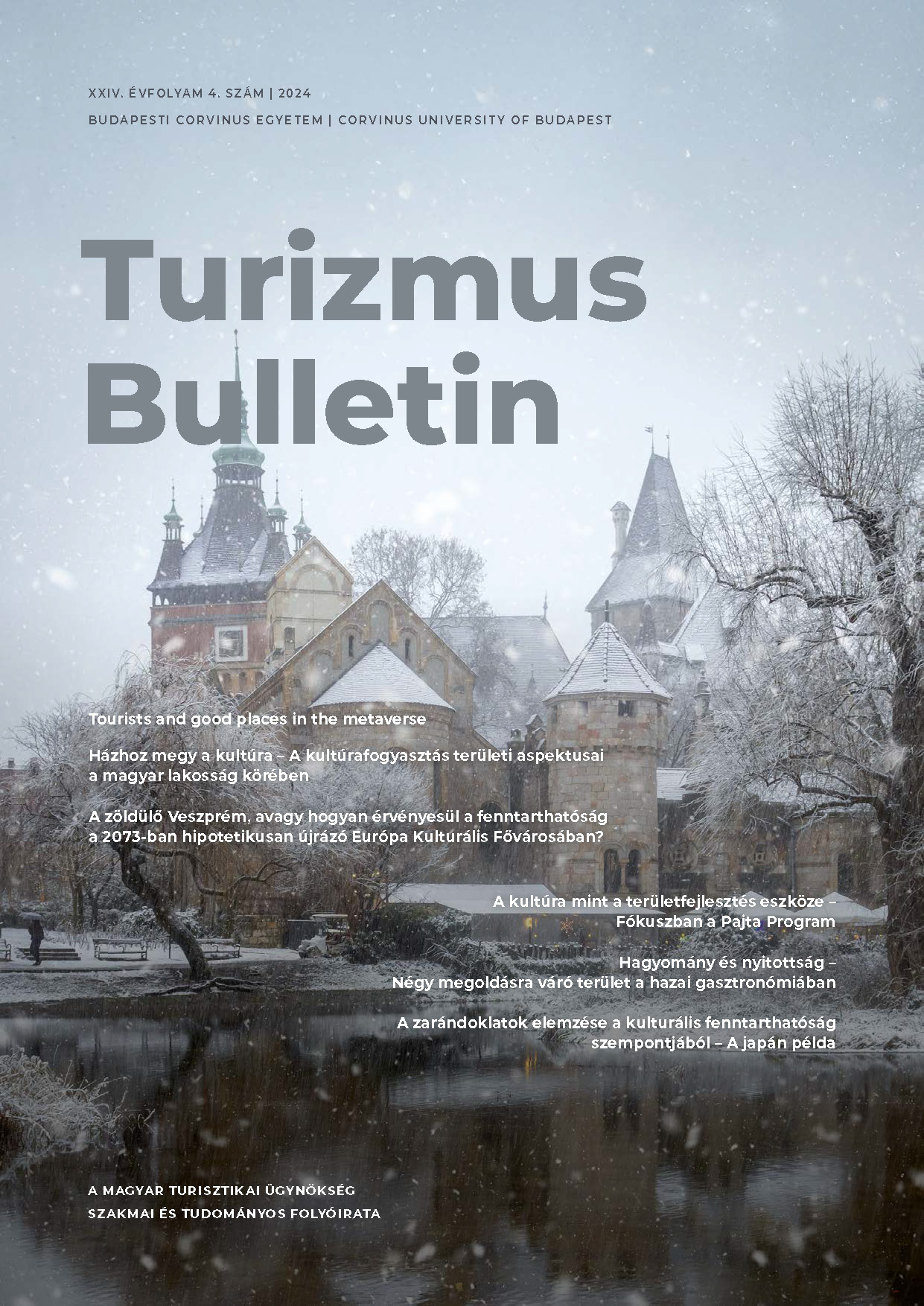Culture as a tool for territorial development – Focus on the Barn Programme
DOI:
https://doi.org/10.14267/TURBULL.2024v24n4.4Keywords:
culture, regional development, European Capital of Culture, local communityAbstract
Today, access to culture has an important role in the quality of life. Regular cultural consumption results
in vibrant, pulsating places being attractive both to locals and visitors. Accordingly, local decisionmakers put great emphasis on making cultural services that raise the image and competitiveness
of cities and regions accessible to all. The “Pajta Program” (Barn Programme), implemented in
the framework of the Veszprém-Balaton 2023 European Capital of Culture (ECoC) programme,
aimed to make local cultural events accessible and building community. The study is based on
the outcomes of semi-structured interviews with stakeholders. Its main objective was to map the
impacts of the programme and to identify the strengths and weaknesses of this type of local cultural
development. According to the results of the research, the program has had a positive impact on
the area, strengthening existing processes and opening up new perspectives and opportunities for
local community life. The implications of this study give input for policy makers cocerning this type
of development tool, valuable information for local stakeholders about how to boost local culture
and local community. For local communities, including residents and service providers, the research
identifies opportunities for involvement.
References
CHARTRAND, H. H. (1990): The hard facts: Perspectives of cultural economics. Transactions of the Royal Society of Canada 1989. Fifth Series, Volume 4. University of Toronto Press.
DZIEMBOWSKA-KOWALSKA, J. – FUNCK, R. H. (1999): Cultural activities: source of competitiveness and prosperity in urban regions. Urban Studies. 36(8). pp. 1381–1398.
ENYEDI GY. (2005): A városok kulturális gazdasága. In: Enyedi G. – Keresztély K. (szerk.): A magyar városok kulturális gazdasága. MTA Társadalomkutató Központ. pp. 13–27.
ENYEDI GY. (2002): A városok kulturális gazdasága. Földrajzi Értesítő. 51(1-2). pp. 19–29.
FÁBIÁN A. – TÓTH B. I. (2013): A kultúra területi mérhetősége és a kistérségek közművelődési jellemzői. Tér és Társadalom. 27(1). pp. 97–114. https://doi.org/10.17649/TET.27.1.1928
FARAGÓ L. (1987): A területfejlesztés fogalmáról. Tér és Társadalom. 1(1). pp. 5-16.
FEKETE, D. (2018): Economic development and economic governance through the example of the city of Győr. Deturope. 10(1). pp. 97–115. DOI:10.32725/det.2018.006 G.
FEKETE É. (2005): Helyi gazdaság- és foglalkoztatás-fejlesztés. Miskolci Egyetem. CROSSEDU Project, HUSK/1101/1.6.1-0300.
GEERTZ, C. (1997): What is a country if it is not a nation? The Brown Journal of World Affairs. 4(2). pp. 235–247.
MORVAY SZ. – RECHNITZER J. – FEKETE D. (2020): Európa Kulturális Fővárosok Kelet-Közép-Európában. Tér és Társadalom. 34(1). pp. 119–139. https://doi.org/10.17649/ TET.34.1.3147
PIRISI, G. – STEFÁN, K. – TRÓCSÁNYI, A. (2008): The role of cultural economy in the revival of cities: Endowments and changes of the city of Pécs. In: Lóczy, D. – Tóth, J. – Trócsányi, A. (szerk.): Progress in Geography in the European Capital of Culture 2010. Imedias. pp. 11–23.
PISKÓTI I. (2023): Rendezvénystratégia kerestetik: Nagyrendezvények szerepe a városmarketingben. Magyar Gazdaságföldrajzi és Településmarketing Műhely. Neumann János Egyetem Gazdaságföldrajzi és Településmarketing Központ, Kecskemét, 10.
Internetes források
GIDA B. (2022): Veszprém-Balaton 2023: Magyarország új kulturális-kreatív régiója. https://papageno.hu/blogok/kreativ-europa-tortenetek/2022/09/veszprem-balaton-2023- magyarorszag-uj-kulturalis-kreativ-regioja/ Letöltve: 2024. március 18.

